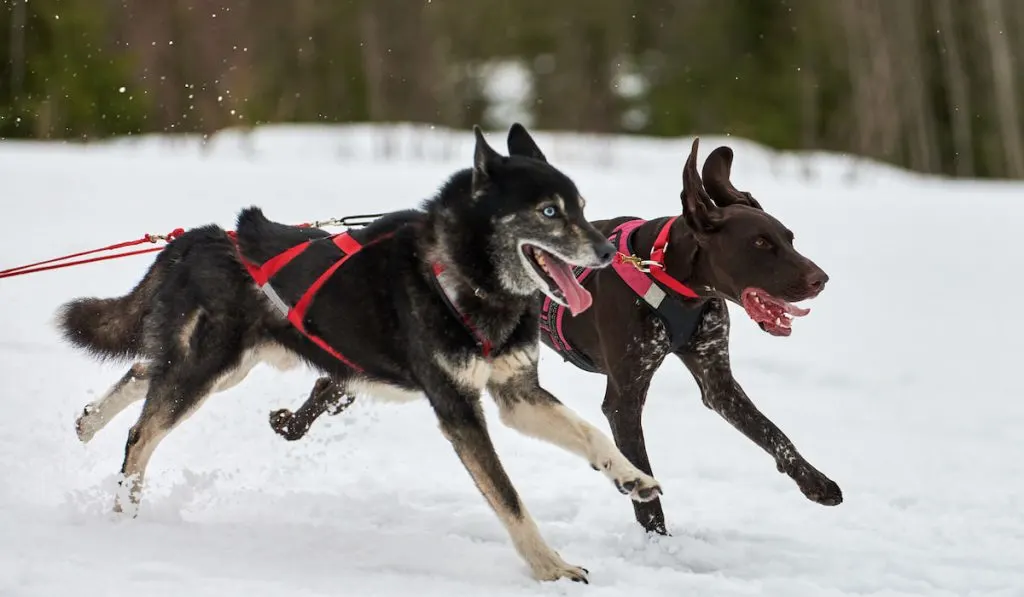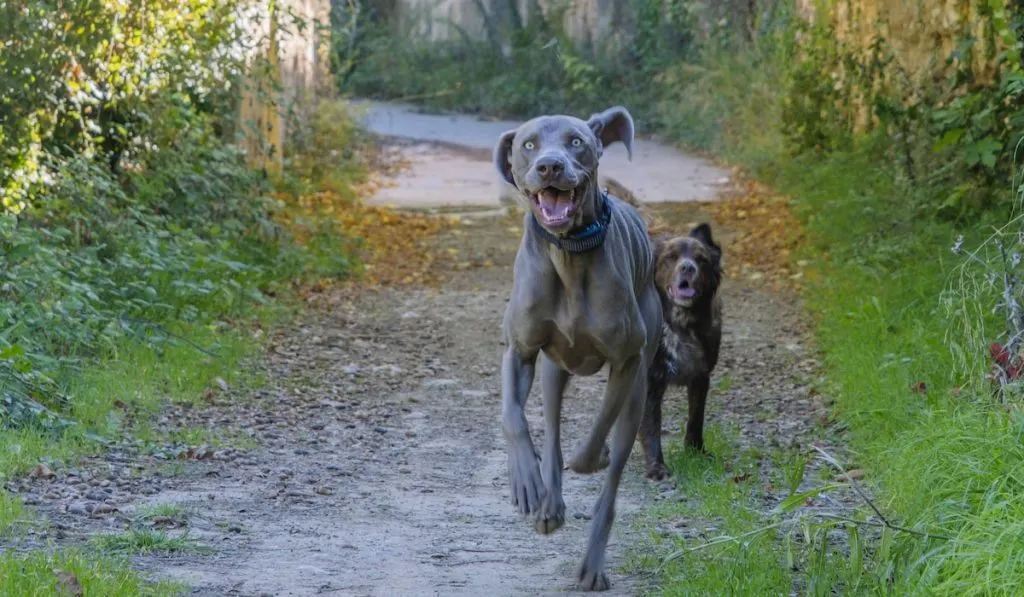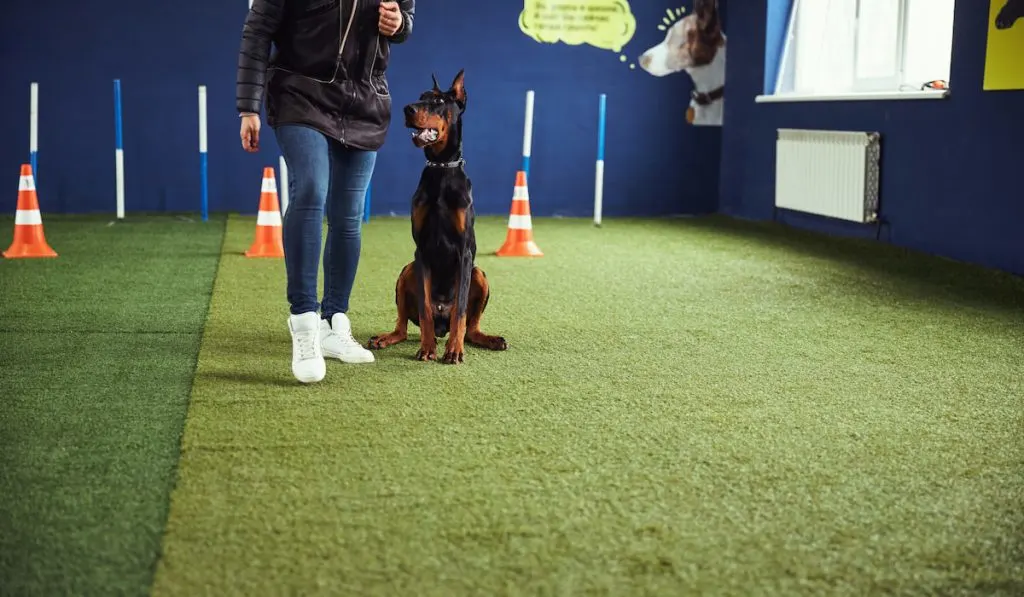Taking your pup on a run is something thousands of Americans wake up and do every day.
You see them out on trails on the weekend or doing laps around the park on a warm afternoon. Exercising with your dog is a great way for both of you to stay in shape and create a closer bond with your pet.
But what are the limits of how far your dog can run? How many miles can you run with a dog?
Even though running just over 26 miles with a dog can seem like a massive leap over your normal 5k, dogs can train up to the level where they can comfortably run a full marathon.
However, not every dog is equipped to run that far, and you need to know whether your dog’s physiology and temperament are well-suited to running long distances.

Knowing how to run with your dog and whether your dog is ready to run a marathon takes work. Here are some things that will help you know whether your companion is up to the task.
Avoid Forced Exercise
Your dog, especially if it’s an enthusiastic puppy, will be dying to go outside on runs with you. They will wait by the door, begging to go outside with you, and jump around at the mere mention of a jog.
Is running with your dog bad? Only if you’re not doing it safely. Running with your dog can be a ton of fun.
Keeping your dog in shape can serve as motivation for you to exercise, and you’ll always have a willing running partner.
How early can you start running with a puppy?

Starting a young puppy on long runs too early can be harmful, though, because their bodies aren’t fully developed, and too much exercise early on can impact their growth and development.
For example, larger dogs need around a year for their growth plates to fully fuse. If you run your dog for several miles before that, then your pet is more likely to be injured.
While your puppy is young, take them out on short jogs where they will get used to the idea of exercising with you.
Avoid the temptation to push them further into long-distance running even if they appear to be doing fine when it comes to energy levels.
Running a Marathon Depends on the Dog
Making blanket statements about dogs running long distances is hard because dogs are so different.
Some breeds, like a vizsla, labrador, and other dogs with similar body types are great runners. They can train to the point where they can finish a marathon step for step with you.
But what about taking a pomeranian or a bulldog on a marathon run? The odds are they won’t be that successful.
You’re more likely to have them plop down in the middle of the trail or the track and refuse to move, and that’s the best-case scenario.
People, unfortunately, have pushed their dogs far past their breaking point, and it can be very detrimental to their health.
If you’re wondering how much running is too much for a dog, it depends on the dog. You should try increasing the distances you run little by little the way you would with a child or a novice runner.
Avoid pushing them too hard, too fast. Even the dogs you would think are the best equipped to run a marathon need training to get there.

Is Long Distance Running Good For Dogs?
Running long distances can be great for dogs, just like it can be a wonderful physical activity for humans.
Again, the main caveat here is that the dog needs to be in running shape and accustomed to running increased distances over time.
Just like you wouldn’t take your friend out for a half marathon on their first run, you don’t want to start your young dog out running very long distances.
When it comes to their physical health, you need to recognize that dogs manage their internal heat much differently than humans.
They don’t sweat like humans do to keep their bodies from overheating. Instead, their heat escapes mainly through their mouths and their footpads.
It can take them longer to cool down because their bodies don’t manage extreme temperatures as well as we do.
People should take that into account before taking a dog on a long-distance run on a hot day.
Ideally, you’ll save your longer runs for early in the morning or evening when it’s not so hot out, or arrange your training schedule to align when climates are a bit cooler.
Either carry a collapsible water container to give your dog a water break in the middle of a run or plot your course through a route where you know there will be water for dogs available.

Increasing Your Dog’s Endurance
Training a dog up to marathon distances can take months and even years. It all depends on your dog and where you’re starting from.
One thing you can do to build your dog’s endurance is, of course, to run! But what if your dog tells you that they don’t want to run and fight you the whole time?
They may just be out of shape and runs are hurting them. To get them in jogging condition, you can start taking them out on long walks.
Playing fetch with them in a field, where there is a ball and more stimulating activity, is another great way to build running endurance.
One thing to keep in mind is that, on average, dogs take as many as four times as many steps as humans do when they run. If you’re on a marathon, that’s a lot of steps!
As a responsible pet owner, you need to pay close attention to how your dog is walking and acting after your long runs.
If they are limping or too lethargic, give them the rest that they need to recover before you take them out on another run. Don’t risk pushing them too hard.

Training for the Race
Don’t forget that, in the hard work that it takes to build up to a marathon, that there’s going to be a lot more going on during the race than just running.
A lot of dogs can be overwhelmed by the crowds, the sound of announcements, and simply the number of people around.
Think about enrolling in some shorter races before you try a marathon. It will help your dog grow accustomed to race conditions so they’ll stay focused when it’s time to run a marathon.
